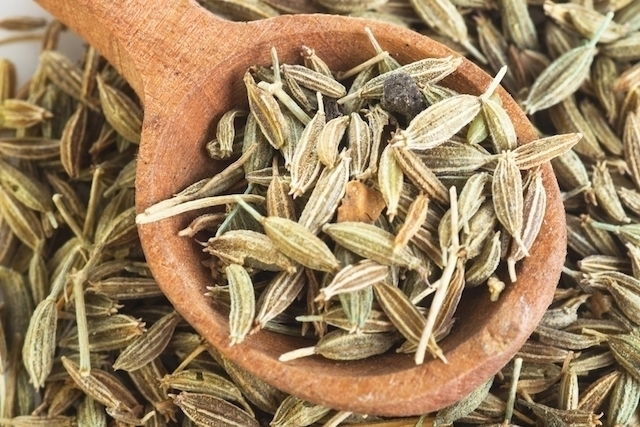Fennel is a medicinal plant that has excellent amounts of tannins, alkaloids, saponins, flavonoids and essential fatty acids. It is widely used as a home remedy to improve digestion, combat gas and colic.
Fennel seeds are very aromatic and, therefore, are commonly used in cooking. They can be added to sweet dishes, like cakes and cookies, as well as savory dishes. The plant is most often used in dishes with meat or fish. Fennel is also used to prepare tea, essential oil, medication and cosmetic products.
Fennel, scientifically known as Foeniculum vulgare, can be purchased in grocery stores, farmer's markets, health food stores or pharmacies in the form of flowers, essential oil, tinctures, leaves or dried seeds.


Health benefits
Fennel can be used to:
- Relieve menstrual and intestinal cramps
- Reduce PMS symptoms
- Combat stomach pain
- Improve digestion
- Combat diarrhea and constipation
- Help control high blood pressure
- Stimulate the production of breast milk
- Combat excess gases
- Help fight flu and colds
- Relieve nausea and vomiting
- Improve anxiety and sleep
- Assist in detoxifying and protecting the liver
- Prevent cardiovascular diseases, such as atherosclerosis or heart attack
- Fight intestinal worms
Fennel leaves and seeds contain compounds such as anethole, saponins, flavonoids, tannins, coumarins and rosmarinic acid, which have relaxing, anti-inflammatory, stimulating, antispasmodic, carminative, antiplatelet, vermifuge, digestive, diuretic action. It is also a mild expectorant.
Difference between fennel and anise
Fennel and anise have a similar appearance and flavor, and are therefore easily confused. However, they are different plants that have different compounds and properties.
Anise is a plant that has white flowers, wide leaves and flowers that are round and small. Learn more about anise and the health benefits it can provide.
Fennel, on the other hand has thinner leaves, yellow flowers and its seeds are more elongated and larger than anise leaves.
How to use
Fennel seeds can be used in the form of essential oil, tinctures, teas or added to cakes or pies. Fennel leaves and stems can be used in cooking to season meat, fish and salads.
Some ways to use the plant are:
1. Fennel tea
Fennel tea helps relieve cramps, diarrhea, and excessive gas, It also helps to increase breast milk production.
Ingredients
- 150 ml of boiling water;
- 1 teaspoon (5 to 7 g) of fresh fennel seeds or leaves
Directions
Add 1 teaspoon of fennel seeds or leaves to the water. Let it soak for 10 to 15 minutes, wait for it cool and drink 1 to 3 times a day.
2. Essential oil
Ingesting essential oil from fennel seeds is safe and is recommended for poor digestion, diarrhea, and excessive gas. It is also recommended for preventing heart attacks and atherosclerosis.
Topical use of the oil can also be indicated for skin lesions, promoting lymphatic drainage, speeding-up wound healing and used as a soothing agent in aromatherapy.
Also recommended: Aromatherapy: Health Benefits, How to Use & Contraindications tuasaude.com/en/aromatherapyThe recommendation dose and frequency varies depending on the objective. Generally you can ingest around 2 to 5 drops of oil diluted in 1 tablespoon of coconut oil or olive oil, 2 to 3 times a day.
To apply to the skin, you can mix a few drops of essential oil with a small amount of oil (like coconut, jojoba or wheat germ), and massage into the skin.
3. Fennel tincture
Fennel tinctures can be used to help combat excess gas, diarrhea and indigestion.
Typically, 10% fennel tincture is recommended, with safe doses ranging from 1 to 3 mL, diluted in 50 mL of water. It can be be taken up to three times a day.
Contraindications for use
Fennel is contraindicated for use during pregnancy as it can increase uterine contractions and cause miscarriages. Furthermore, it should not be consumed by children, or anyone with a history of epilepsy and in children. Fennel should also be avoided by those with hyperestrogenism and by women with heavy menstrual flow.
This plant can also cause allergic skin reactions. It is also important to note that you should avoid using fennel for a prolonged period of time.
Fennel tincture should not be used by pregnant or breastfeeding women, alcoholics or diabetics, as it contains alcohol. It is also contraindicated for people with reflux and should be consumed with caution for those who do not wish/can become pregnant, as fennel tincture may reduce the effect of contraceptive medications.
Before starting to use fennel, it is important to consult a doctor or other medicinal plant specialist to prevent possible adverse effects from using the plant.
